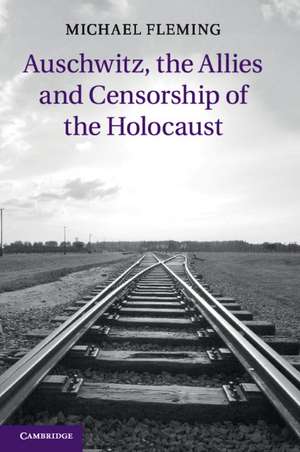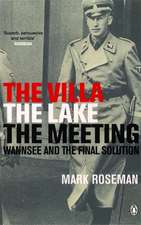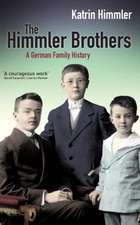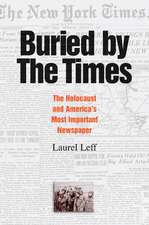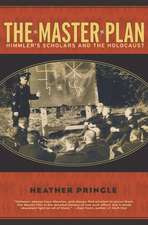Auschwitz, the Allies and Censorship of the Holocaust
Autor Michael Flemingen Limba Engleză Paperback – 10 mar 2021
| Toate formatele și edițiile | Preț | Express |
|---|---|---|
| Paperback (1) | 323.65 lei 6-8 săpt. | |
| Cambridge University Press – 10 mar 2021 | 323.65 lei 6-8 săpt. | |
| Hardback (1) | 757.52 lei 6-8 săpt. | |
| Cambridge University Press – 16 apr 2014 | 757.52 lei 6-8 săpt. |
Preț: 323.65 lei
Nou
Puncte Express: 485
Preț estimativ în valută:
61.93€ • 65.12$ • 51.17£
61.93€ • 65.12$ • 51.17£
Carte tipărită la comandă
Livrare economică 17 aprilie-01 mai
Preluare comenzi: 021 569.72.76
Specificații
ISBN-13: 9781107633667
ISBN-10: 1107633664
Pagini: 416
Dimensiuni: 150 x 227 x 20 mm
Greutate: 0.56 kg
Editura: Cambridge University Press
Colecția Cambridge University Press
Locul publicării:New York, United States
ISBN-10: 1107633664
Pagini: 416
Dimensiuni: 150 x 227 x 20 mm
Greutate: 0.56 kg
Editura: Cambridge University Press
Colecția Cambridge University Press
Locul publicării:New York, United States
Cuprins
Acknowledgements; List of abbreviations; 1. Introduction; 2. Censorship, self-censorship and the discursive environment; 3. The Polish government in exile in London; 4. Intelligence about Auschwitz: November 1940–February 1943; 5. British suppression of news of Auschwitz: March 1943–June/July 1944; 6. Reassessing the significance of the Vrba/Wetzler report; 7. Conclusion; Appendix 1. Information about Auschwitz to reach the West, November 1942–June 1944; Appendix 2. Archives and historians; Bibliography; Index.
Recenzii
'Michael Fleming has made a major contribution to the historiography of the Holocaust, and in the process has demonstrated formidable skill as a scholar as well as admirable moral courage … His book is undoubtedly one of the most important in the study of the Holocaust in the last twenty years.' Alexander J. Groth, Israel Journal of Foreign Affairs
'Michael Fleming's book is a meticulous investigation into what was known, could have been known, and was transmitted in what fashion about Auschwitz. He details the flow of information by looking at the documents smuggled, the informants debriefed, and the articles published in both the Jewish and Polish press abroad as well as the general press in Britain and the US, with the occasional analysis of the press of other Allied and neutral countries. … A meticulously researched and well-organized book, it raises many more questions than it could possibly answer; questions that will continue to preoccupy us.' Stefan Ihrig, European History Quarterly
'Michael Fleming's book is a critical addition to the historiography on the intelligence aspects of the Holocaust, particularly the ways in which reliable information concerning the murder of Europe's Jews - and, specifically, information on the Auschwitz concentration and extermination camp - became known in Allied capitals and how the Allied governments disseminated and acted on this information.' Norman J. W. Goda, The Journal of Modern History
'Michael Fleming's book is a meticulous investigation into what was known, could have been known, and was transmitted in what fashion about Auschwitz. He details the flow of information by looking at the documents smuggled, the informants debriefed, and the articles published in both the Jewish and Polish press abroad as well as the general press in Britain and the US, with the occasional analysis of the press of other Allied and neutral countries. … A meticulously researched and well-organized book, it raises many more questions than it could possibly answer; questions that will continue to preoccupy us.' Stefan Ihrig, European History Quarterly
'Michael Fleming's book is a critical addition to the historiography on the intelligence aspects of the Holocaust, particularly the ways in which reliable information concerning the murder of Europe's Jews - and, specifically, information on the Auschwitz concentration and extermination camp - became known in Allied capitals and how the Allied governments disseminated and acted on this information.' Norman J. W. Goda, The Journal of Modern History
Notă biografică
Descriere
An important contribution to the ongoing debate about what the Allies knew about the concentration camps during the Second World War.
